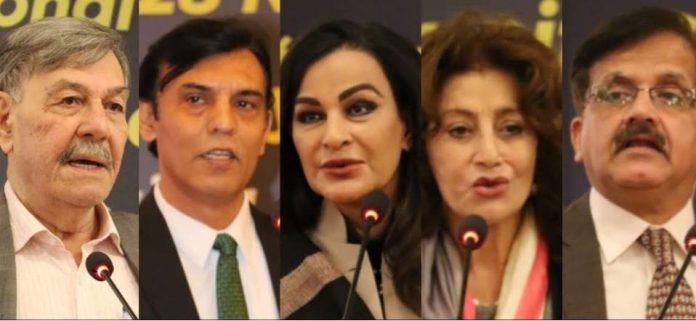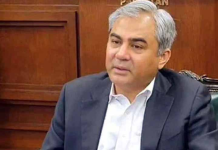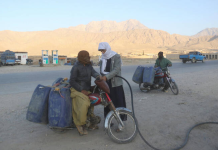ISLAMABAD, Oct 25 (DNA): Former Federal Minister for Climate Change Senator Sherry Rehman on Wednesday said the Loss and Damage Fund (LDF) is an entitlement for the climate vulnerable countries and not a charity which the developed world must understand to ensure climate justice.
She was addressing at a Pre-COP28 national consultation titled “Community resilience to disasters and climatic hazards- Amplifying voices of the vulnerable people from the frontline” as keynote speaker organized by the Sustainable Development Policy Institute (SDPI) in partnership with Oxfam, Strengthening Participatory Organization (SPO) and other partners.
Senator Sherry Rehman said the global climate change discourse has shifted inwards with the focus on indigenous solutions to cope with the risks of environmental degradation.
In Pakistan, she said there is a hope that it will receive something from the international community because it has emerged as the most vulnerable country due to climate change despite very low carbon emissions.
The Senator said this cynicism must end that if the country is not getting compensation for its losses at the hands of climate catastrophes, then it should halt climate change adaptation and mitigation efforts. “These are the rights of the country like Pakistan to address its climate vulnerability if there is no help from the world community. Don’t let your minds affected by cynicism and colonization,” she said.
In his welcome remarks, Executive Director, SDPI, Dr Abid Qaiyum Suleri said it is easy to make policy for the vulnerable communities, but it is they who are the best teachers to guide policy decisions for preventive and mitigation measures during climate catastrophes due to their direct exposure to the natural hazards and their local knowledge which is of paramount importance.
“Pakistan should also establish its own loss and damage fund to address the inequalities due to climate crisis as there are areas that are variably impacted due to climate disasters” he suggested.
Executive Director, Civil Society Coalition for Climate Change (CSCCC) Aisha Khan said it is necessary to observe the geography of the country to learn about the socio-economic realities that vary from community to community and area to area for informed climate action. She mentioned that the communities’ voices exist, but it did not matter and for that it is necessary to empower those voices through inclusive engagement.
Speaking on the occasion, Chairman BoG, SDPI Ambassador (R) Shafqat Kakahel extended his felicitations to SDPI, SPO and Oxfam for partnering on climate change and natural disasters.
The climate crisis would have direct impacts on communities and the best characteristic of this effort is the effective engagement with the local communities. “This is the first time, I witnessed local communities presenting their stories before the civil society and partners which should be considered in the future endeavors as well,” he added.
CEO, National Disaster Risk Management Fund (NDRMF) Bilal Anwar said the country needs a new social contract based on the latest vulnerabilities emerging with every passing year as it was crucial to amplifying the voices of communities impacted by natural disasters.
The indigenous knowledge and observations in the communities needs to be incorporated in the mainstream policy discourse and interventions by promoting a bottom to top approach, he added.
Chairman Federal Flood Commission (FFC) Ahmed Kamal said after 2005 earthquake, the country had started community-based disaster risk management efforts. “We need to do knowledge sharing of local knowledge from local to regional and global levels to ultimately achieve community resilience,” he added.
Deputy Executive Director, SDPI, Dr Shafqat Munir said the SDPI alongwith Oxfam started efforts to influence climate and disaster risk reduction (DRR) agenda in Pakistan before COP-28 and has published four policy papers on various aspects of climate action. The whole of society approach, he said was key to achieve the task of climate resilience within the minimum available resources.
Country Director, Oxfam Pakistan, Syed Shahnawaz Ali said there is a need to realise our individual responsibilities to ensure effective climate action and it is crucial to understand the climate challenge.
“We need to incorporate the suggestions and experiences of the impacted communities into our policy endeavours for an extended role to be played by the partners for the local communities,” he added.
Consultant SPO, Saadullah Ayaz said Pakistan is among the most impacted countries due to climate change and repeatedly battered by climate disasters, whereas the gender inequality in our society further aggravates this crisis.
Director Punjab Emergencies Services Department, Dr Rizwan Naseer via videolink presented a short documentary on the Rescue 1122 journey and advocated the need for basic life support training for all.
The discussion also showcased the life stories of climate disaster survivors mostly women who presented their local experiences during natural hazards. The women from Sindh, Punjab and Khyber Pakhtunkhwa affected by 2022 floods expressed their views.

















